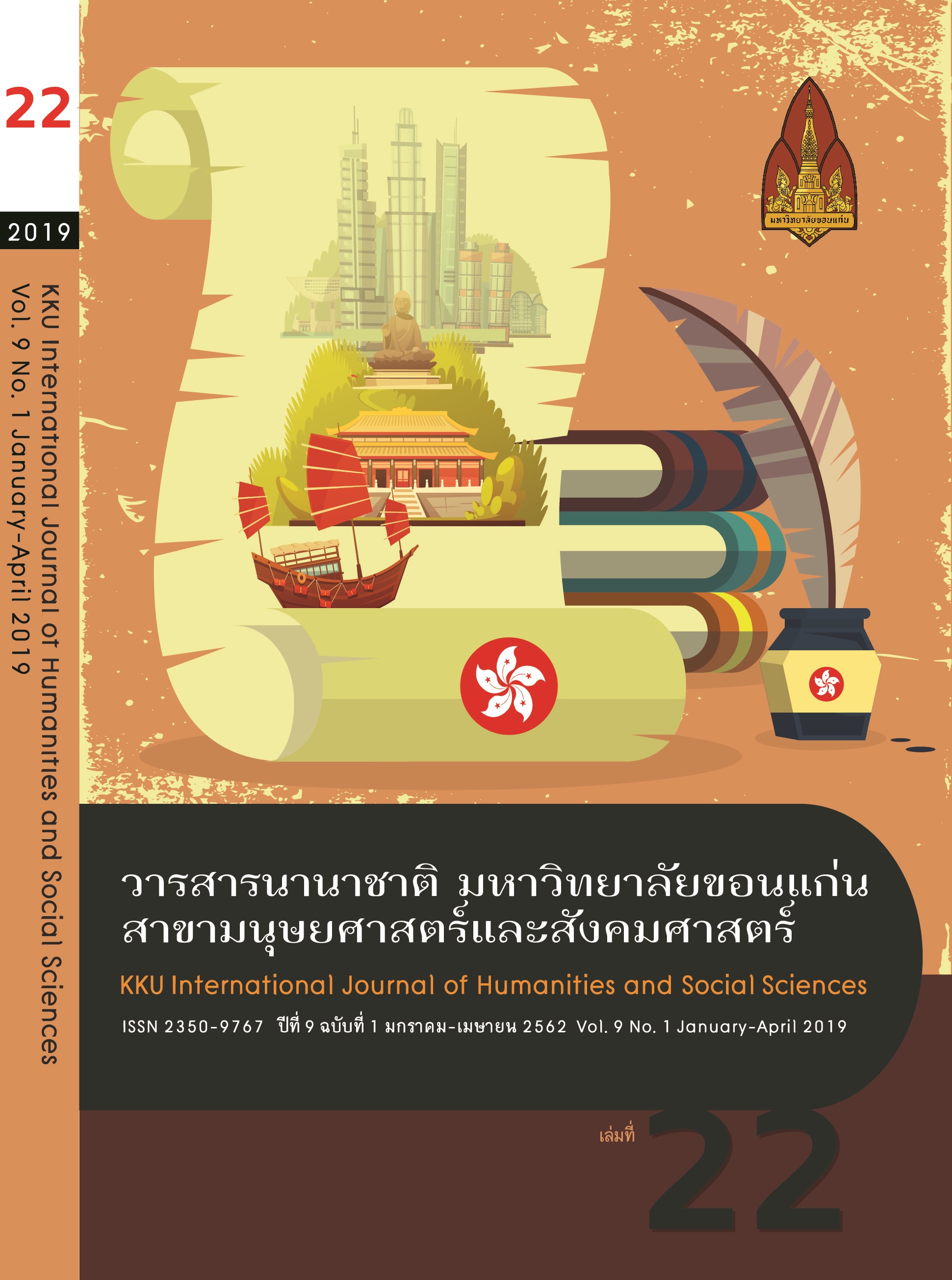The influence of online social media on well-being of people in Udon Thani municipality
Main Article Content
Abstract
This research aimed to study the influence of online social media on well-being of people in Udon Thani municipality. The data were collected from the questionnaires disseminated among the sample group in Udon Thani municipality, total 383 people. The data were analyzed by descriptive statistic and deductive statistic. The result revealed that most of the sample used the online social media via the mobile phone, and often used in their private house areas for 1 - 2 times per day since the mid-day to 6.00 p.m., and spent 30 minutes - 1 hour for each time. The purposes of usage were to communicate and make the conversation with friends and other people. The online social media had good impact on mental health for entertainment and on intelligence by enhancing knowledge and any information reception; however, the media can cause a negative effect to physical health on eye problems and also affect to social health by lacking of time for people surrounded. The online social media in kind of the user account and the media accessing location, the period of usage, the purpose of usage, the type of online social media, and the advantage of usage. These online social media could predict the well-being of population in Udon Thani municipality for 67.7 percent.
Article Details
References
จิตติพันธ์ ความคนึง และ มฤษฎ์ แก้วจินดา. (2559). การปรึกษาแบบกลุ่มด้วยเทคนิคการสร้างความมั่นคงทางจิตใจเพื่อเสริมสร้างทักษะการเผชิญปัญหา สำหรับเยาวชนที่ถูกรังแกผ่านโลกไซเบอร์. วารสารบัณฑิตศึกษา มหาวิทยาลัยราชภัฏวไลยอลงกรณ์ ในพระบรมราชูปถัมภ์.
จิรภัทร เริ่มศรี. (2557). พฤติกรรมการใช้สื่อสังคมออนไลน์ที่มีผลกระทบต่อการดำเนินชีวิตของนักศึกษามหาวิทยาลัยราชภัฏสกลนคร. สาขาวิชานิเทศศาสตร์ คณะวิทยาการจัดการ มหาวิทยาลัยราชภัฏสกลนคร.
ธีรวุฒิ เอกะกุล. (2543). ระเบียบวิธีวิจัยทางพฤติกรรมศาสตร์และสังคมศาสตร์. อุบลราชธานี : สถาบันราชภัฎอุบลราชธานี.
ปานระพี รพิพันธุ์. (2557). สถิติการเติบโตของผู้ใช้ Facebook ในไทย และช่วงเวลาไหนคนใช้ facebook มากที่สุด. เรียกใช้เมื่อ 30 ตุลาคม 2560 จาก IT 24 Hrs ไอที24ชั่วโมง เทคโนโลยีใกล้ตัว เพื่อชีวิตที่ดีขึ้น: https://www.it24hrs.com/2014/infographic-thai-facebook-user-2014/
. (2559). สรุปสถิติผู้ใช้ Social Media ในไทยจากงาน Thailand Zocial Awards 2016. เรียกใช้เมื่อ 30 ตุลาคม 2560 จาก IT 24 Hrs ไอที24ชั่วโมง เทคโนโลยีใกล้ตัว เพื่อชีวิตที่ดีขึ้น: https://www.it24hrs.com/2016/stat-social-media-thai-populations/
วันวิสาข์ เจริญนาน. (2555). พฤติกรรมการใช้โซเชียลมีเดีย (Social Media) ของคนในกรุงเทพฯ. กรุงเทพมหานคร: ศูนย์วิจัยเอแบคนวัตกรรมทางสังคม การจัดการ และธุรกิจ มหาวิยาลัยอัสสัมชัญ.
วิมลทิพย์ มุกสิกพันธ์, สุจินดา ย่องจีน, และ สาลินี จันทร์เจริญ. (2554). โครงการศึกษาการจัดการพฤติกรรมข่มเหงรังแกผ่านโลกไซเบอร์ด้วยการมีส่วนร่วมของครอบครัว. กรุงเทพมหานคร: มหาวิทยาลัยมหิดล.
เอมิกา เหมมินทร์. (2556). พฤติกรรมการใช้และความคิดเห็นเกี่ยวกับผลที่ได้จากการใช้เครือข่ายสังคมออนไลน์ (Social Media) ของประชาชนในเขตกรุงเทพมหานคร. ปริญญานิพนธ์มหาบัณฑิต, สถาบันบัณฑิตพัฒนบริหารศาสตร์.
Honestdocs. (ม.ป.ป.). โซเชียลมีเดียส่งผลต่อสุขภาพจิตอย่างไร. เรียกใช้เมื่อ 18 พฤศจิกายน 2560 จาก Media Affects Mental Health: https://www.honestdocs.co/social-media-affects-mental-health
Kowalski & Limber. (2013). Psychological, physical, and academic correlates of cyber bullying and traditional bullying. เรียกใช้เมื่อ 31 พฤศจิกายน 2560 จาก https://www.ncbi.nlm.nih.gov/pubmed/23790195
Krejcie and Morgan. (1970). DETERMINING SAMPLE SIZE FOR RESEARCH. เรียกใช้เมื่อ 10 กรกฎาคม 2560 จาก https://home.kku.ac.th/sompong/guest_speaker/KrejcieandMorgan_article.pdf
Smith, Merritt Roe; and Leo Marx, eds. (1994). Does Technology Drive History? The Dilemma of Technological Determinism. Cambridge: MIT Press.


